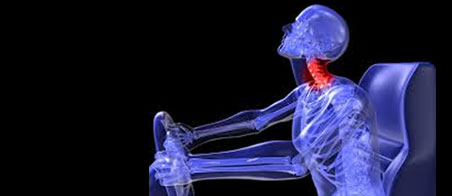
CAR CRASH AND NECK INJURIES
 You’re sitting at a stop light or in a line of bumper-to-bumper traffic on a highway, and……WHAM……you’re rear-ended by an inattentive driver. Your neck is sore, and you may have a headache. You may be taken by ambulance to the ER or go to the immediate care center or your primary care physician on your own after the accident. They will likely diagnose you with a cervical strain (“whiplash”) and prescribe you some pain relievers and in 4-6 weeks you will be good as new. But what happens if you’re not ok in the near future?
You’re sitting at a stop light or in a line of bumper-to-bumper traffic on a highway, and……WHAM……you’re rear-ended by an inattentive driver. Your neck is sore, and you may have a headache. You may be taken by ambulance to the ER or go to the immediate care center or your primary care physician on your own after the accident. They will likely diagnose you with a cervical strain (“whiplash”) and prescribe you some pain relievers and in 4-6 weeks you will be good as new. But what happens if you’re not ok in the near future?
You may be one of the unlucky people who take longer to recover than normal or who do not respond well to treatment. If your original course of pain meds along with your refill have run out, you may need to consider physical therapy to work out the kinks. Many times meds along with physical therapy will help even the most painful neck strains, but sometimes those conservative therapy regimes don’t work either. What do you do now? It has been nearly two months, and you don’t feel better from your neck injury from a car crash?
You may be referred to get facet point injections in the site on your body where the pain is still occurring. These initial injections will usually do the trick. You will feel better, get back to your normal routine, whether it be work or working out. You can count yourself lucky that nothing worse happened. You can turn in your medical bills and lost wages to the insurance company of the person who rear-ended you and you can settle your claim. What if those injections still don’t help? What if it’s a year later and you still have headaches, a sore neck and you feel fatigued?
You may need more aggressive treatment called nerve ablation therapy. With ablation therapy, heat waves are used to kill tissue that is causing pain to radiate throughout your body. This procedure will often allow for longer periods of pain relief than the standard facet point injection. Relief is usually felt about 48 hours after the procedure takes place. Patients who receive ablation therapy will need to rest and avoid driving after the procedure and must communicate with their doctors about what pain relievers may be used immediately following the procedures.
Ablation therapy typically relieves pain for anywhere from 6-8 months to a year. The procedure may not be a long-term solution and does have the risk of side effects such as allergic reaction or infection, so all options should be considered with your doctor when dealing with a long-term neck injury. Be informed about what the risks and benefits and stay in constant communication with your healthcare provider along each step of the way.
Consult a legal professional PRIOR to signing a claim settlement. An attorney that is knowledgeable in injury laws can assist you with your insurance claim. We are here for you.








